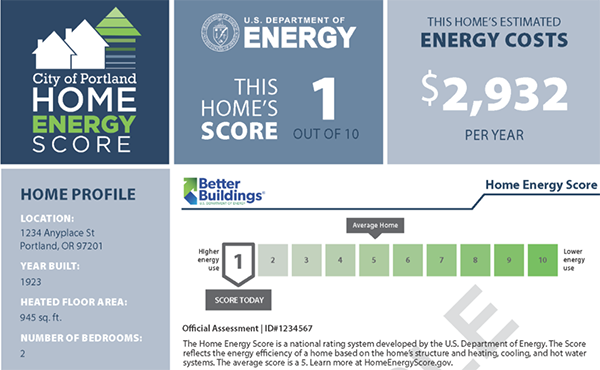Since the Home Energy Score (HES) became a legal requirement for most Portland, Hillsboro, and Milwaukie home owners wanting to put their homes on the market, concerns about a score of 1, the lowest end of the 10-point scale, raise questions for some sellers and home buyers. Will a score this low make it harder to sell their home? Should they invest in making improvements to try and raise the score?
Likewise, buyers also want to know what this means. Should they not buy the home they love because it’s scored a 1? Should they ask for upgrade contingencies or plan to make upgrades after they buy the home, depending on the cost involved?
In this article, we’ll share our thoughts about the meaning of a 1 score and what that might mean for you, whether you’re a seller or a buyer.
Where are Home Energy Score Results Accessible?
If you lose track of a home energy score report, you can always find it on the Green Building Registry. All official home energy scores can be found on that link. Simply type in the address.
Whether you’re advertising the sale of your home in print or online, your HES Report is required to be visible to all potential buyers. An easy way to accomplish this is to have printed copies of the report available in your home so people can pick them up when they do walk throughs or attend open houses. This is a service our home energy score company provides (order a home energy score here).
What Does the Home Energy Score Report Tell Us?
In a nutshell, a detailed HES Report tells buyers how much energy a home uses per year compared to other homes in the area. The report also states if the home generates renewable energy and how much, potential improvements that might increase the home’s energy efficiency, and what a new HES might be if improvements are made.
A qualified, professional home energy assessor will use a variety of criteria to estimate your home’s energy use, however, the assessor will not measure a home’s actual energy use by its current occupants as that can vary from owner to owner.
The items you’ll find on a HES Report are:
- Home Energy Score—based on the home’s size, orientation, roof materials, insulation, window type, and insulation, to name a few
- Energy costs—estimate based on what are considered typical use patterns in similar homes. (Actual usage and costs may differ from the report dependent on occupant choices and behaviors.)
- Assessment date—date the assessment was completed
- Score expiration date—score is valid until this date, unless changes are made to energy efficiency, mechanical systems, or square footage. (After this date, a new assessment is required.)
- Score with priority improvements—possible future score if recommended improvements are made
- Estimated carbon reduction with priority improvements—level of carbon reduction potentially possible if recommended improvements are made
- Priority energy improvements—energy improvement recommendations, customized for the home, that will realize ROI within ten years or less. (Other energy efficiency improvements could have positive results but may come after the ten-year window.)
- Additional energy improvements—other energy improvement recommendations that may realize ROI and improve HES but may come after the ten-year window
What Does a Home Energy Score of 1 Mean for Sellers?
Let’s talk about the home energy score rating from 1 to 10.
If your home scores a 5 out of 10, that means its energy efficiency is deemed to be like that of an average home in Portland. A 10 equates to your home being in the top 10% of homes likely to use the least amount of energy. A home energy score of 1 means your home likely uses more energy annually than 85% of Portland homes.
If your home scores a 1, this doesn’t necessarily mean that it’s poorly built—even highly appealing homes with state-of-the-art equipment can get low scores. Square footage is a huge factor (the bigger the home the lower the score), and so is the level, type, and quality of insulation.
A score of 1 means is that there’s a lot of room improve energy use, or perhaps you’re looking at a home that is significantly larger than a median sized property in Portland.
What Does a Home Energy Score of 1 Mean for Buyers?
A score of 1 isn’t an instant sign that you need to bypass a home you love. Of course, you’ll want to take a close look at the report and make sure you understand what caused the score. You’ll also want to check out the priority recommendations listed there.
Typically the seller is not going to improve the score in any way before closing. A low score isn’t a something a home buyer can expect to put on a repair addendum during escrow. The low score is evident and published prior to the home buyer making an offer. The home buyer has to decide if they want to take on a home with a low score. There may be a number of low cost and DIY solutions that could raise the score significant and immediately. We’ve created a list of simple DIY recommendations here.
Want to Know More About the Home Energy Scores?
Still not sure about how a local Home Energy Score program might impact you?
Check out our articles: What Does a Home Energy Score Mean? and 5 Myths About Portland’s Home Energy Scores.

